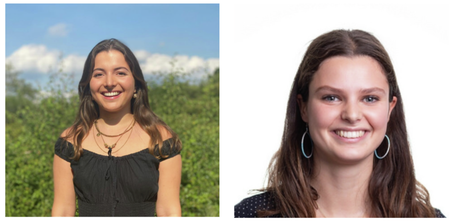The Oxbridge founders of an app to track your friends at the club
Oxford and Cambridge students Tamzin Lent and Olivia Leigh talk to Tiffany Tsoi about tackling female safety with an app which will allow people to share their precise locations in nightclub venues

It was in the beginning of the first lockdown when the idea of Where You At (WYA) came to Oxford students Tamzin Lent and Olivia Leigh. Thinking about the freshers’ experience post-pandemic, Tamzin, who is currently still a third-year at Oxford, reflected on how exposed she had often felt at nightclubs and big events when she lost her friends: “If I, as a 20-year-old, can feel this vulnerability, how much more dangerous can it be for 18-year-old freshers fresh out of a pandemic?”
There seemed to be a simple solution: “It’s so easy to be a target when you lose your friends, and the more I talk to people about it, the more it seems that this is a universal issue. There was just a clear need for an app that could tell you where your friends were in the club.”
Since then, what began as a seed of an idea has quickly fledged into a fully formed startup. Despite not knowing anything about how to design an app, Olivia and Tamzin got the ball rolling: “For me, it started with just making some designs to see what it would look like – putting some wireframes together,” says Tamzin. Instead of attempting to build the app themselves, they raised money to hire a team of third-party developers who have been responsible for the technical process. “Quite often with startups, the expectation is that you launch an app, and it fails a bit, and it’s just rubbish. We felt like we couldn’t do that if it was a safety app,” Olivia explains.
“If I, as a 20-year-old, can feel this vulnerability, how much more dangerous can it be for 18-year-old freshers fresh out of a pandemic?”
The process of building the startup has been relatively smooth, they tell me. Lockdowns over the past two years have made it easy for the founders to throw themselves into the project, and they’ve also found venues and companies to be receptive to their ideas. “Venues are desperate to help and do something to tackle safety, which is obviously good for their business,” Olivia says. “Everyone has been very generous with their time. Of course, it’s been a little difficult to tie everything in together, from the technology to the venue partnerships to the users, as people with not very much business experience to begin with.” One of their big milestones thus far has been gaining recognition and a partnership with the Night Time Industries Association (NTIA): “For us, this has shown real appetite from the nighttime industry for a safety solution.”
Almost two years later, the app is almost ready, and has begun its testing stage at local venues in Oxford as well as London. The technology uses Bluetooth beacons which are placed around the venue, allowing the space to be mapped. This works in combination with a digitised floor plan of the venue, which is also uploaded onto the app. Users at events can subsequently move around whilst the app shows their precise location to friends. WYA is planned to officially launch around springtime this year, but it has already garnered significant attention – featuring in The Guardian last year in addition to winning prizes such as the Downing Enterprise Pitch Award.
Apart from third-party developers, the internal team has remained small. Tamzin works on the app part-time alongside her degree. Olivia, who recently graduated from Cambridge with a master’s, works full-time at the startup as the interim CEO, whilst Tamzin finishes her studies. Through a university friend, they also met Jamie Legg, who, with a coding background, is now the CTO overseeing the development of the app. Having just finalised their first round of fundraising, balancing the emotive and highly personal dimension of the cause with the development of a strong business model has been key to pitching to investors: “It can be a bit tricky because these are two very different conversations – but it’s obviously important that they both happen. Investors have been really keen, and it’s been a really good process,” Olivia tells me. The business plan is to charge venues with a subscription fee, or a pay-per-user fee for big events, while the app remains free for users. “It’s a safety solution for venues, and we’re hoping it will drive people to the clubs that offer the service. Building safer spaces at these events is just going to be great for the nighttime industry, as well as for customers.”
“Building safer spaces at these events is just going to be great for the nighttime industry, as well as for customers”
Tackling the problem of female safety is clearly something of immense importance to the founders. Research they’ve conducted has shown that 92% of 1.2 thousand surveyed students regularly felt unsafe on nights out, and when asked what the most pressing issue affecting their nightlife was, 65% said sexual abuse. In light of the recent spiking epidemic, occurring not only in Cambridge clubs, but at universities across the UK, the need for a solution has never been so pronounced. “Venues can definitely be doing more,” says Olivia. “It’s important that we think about proactive solutions [on top of club boycotts].” The hope is that their app will provide one. As Tamzin affirms: “This is an app engineered by women, made for women.”
Although the issue seems to be mostly gender-specific, Tamzin and Olivia tell me that their findings show that this is a problem that pertains to men as well. With the surge in reported incidents of spiking, and the subsequent increase in attention that has been paid to general safety at club events: “A lot of men are beginning to feel they are targeted as well,” Olivia says. Tamzin further highlights the relevance of the issue for those who are non-binary. “It’s just become an endemic issue for every kind of club, absolutely everywhere.”
For those who are acquainted with the impossible demands of an Oxbridge degree, the notion of being a startup founder on the side may seem to border on insanity: “It’s been difficult with finals, which is why Olivia taking over as CEO has been incredible,” Tamzin tells me. “But the passion and enthusiasm has been crucial to getting us through. I channel my anger from past experiences I’ve had and those emotions all go into WYA.” Olivia agrees, saying: “The fact that there’s a problem to be solved keeps momentum [going]. Often it can make it easier to put [WYA] before university work, actually, which can be an issue.”
“I channel my anger from past experiences I’ve had and those emotions all go into WYA”
Looking to the future, the ambition is that people can go to certified venues which they can trust and where they know they will be safe, with a strong line of communication between venues and event-goers, mediated by the app. “That would be the dream, and there’s definitely the demand for that. It’s just about getting the logistics going.” And for both founders, it’s full steam ahead. Tamzin says: “As soon as finals end, I’ll be working on this full-time. It’s that sense of mission. I’ve learnt that this is one of the most important parts of doing any project; there’s a clear sense of ‘why’.”
 News / SU reluctantly registers controversial women’s soc18 December 2025
News / SU reluctantly registers controversial women’s soc18 December 2025 News / CUP announces funding scheme for under-represented academics19 December 2025
News / CUP announces funding scheme for under-represented academics19 December 2025 Features / Should I stay or should I go? Cambridge students and alumni reflect on how their memories stay with them15 December 2025
Features / Should I stay or should I go? Cambridge students and alumni reflect on how their memories stay with them15 December 2025 Fashion / The art of the formal outfit 18 December 2025
Fashion / The art of the formal outfit 18 December 2025 Lifestyle / Summer lovin’ had me so… lonely?18 December 2025
Lifestyle / Summer lovin’ had me so… lonely?18 December 2025









